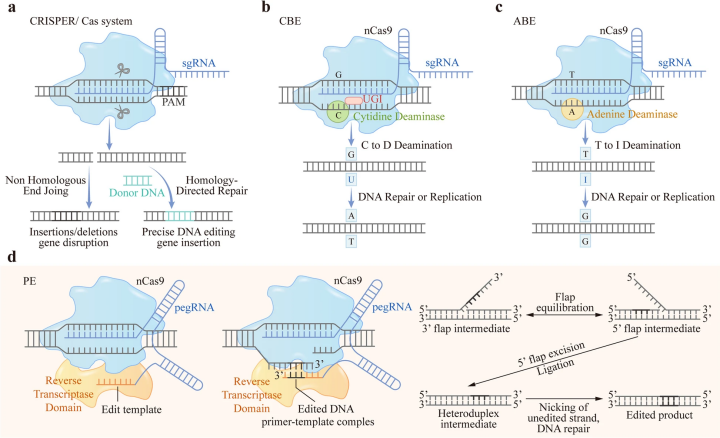Molecular Biomedicine | CRISPR/Cas systems usher in a new era of disease treatment and diagnosis

Open the phone and scan

Mechanisms of CRISPR/Cas system, BE and PE
The discovery and development of the CRISPR/Cas system is a milestone in precise medicine. CRISPR/Cas nucleases, base-editing (BE) and prime-editing (PE) are three genome editing technologies derived from CRISPR/Cas. In recent years, CRISPR-based genome editing technologies have created immense therapeutic potential with safe and efficient viral or non-viral delivery systems. Significant progress has been made in applying genome editing strategies to modify T cells and hematopoietic stem cells (HSCs) ex vivo and to treat a wide variety of diseases and disorders in vivo. Nevertheless, the clinical translation of this unique technology still faces many challenges, especially targeting, safety and delivery issues, which require further improvement and optimization. In addition, with the outbreak of severe acute respiratory syndrome coronavirus 2 (SARS-CoV-2), CRISPR-based molecular diagnosis has attracted extensive attention. Growing from the specific set of molecular biological discoveries to several active clinical trials, CRISPR/Cas systems offer the opportunity to create a cost-effective, portable and point-of-care diagnosis through nucleic acid screening of diseases. In this review, we describe the development, mechanisms and delivery systems of CRISPR-based genome editing and focus on clinical and preclinical studies of therapeutic CRISPR genome editing in disease treatment as well as its application prospects in therapeutics and molecular detection.
Article Access: https://doi.org/10.1186/s43556-022-00095-y
More about Molecular Biomedicine: https://www.springer.com/journal/43556
Looking forward to your contributions.


